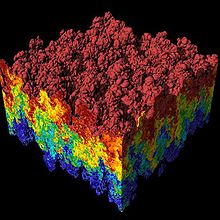- Computational physics
-
This article is about computational science applied in physics. For theories comparing the universe to a computer, see digital physics.
Computational physics 
Numerical analysis · Simulation
Data analysis · VisualizationParticleScientistsComputational physics is the study and implementation of numerical algorithms to solve problems in physics for which a quantitative theory already exists. It is often regarded as a subdiscipline of theoretical physics but some consider it an intermediate branch between theoretical and experimental physics.
Physicists often have a very precise mathematical theory describing how a system will behave. Unfortunately, it is often the case that solving the theory's equations ab initio in order to produce a useful prediction is not practical. This is especially true with quantum mechanics, where only a handful of simple models admit closed-form, analytic solutions. In cases where the equations can only be solved approximately, computational methods are often used.
Applications of computational physics
Computation now represents an essential component of modern research in accelerator physics, astrophysics, fluid mechanics, lattice field theory/lattice gauge theory (especially lattice quantum chromodynamics), plasma physics (see plasma modeling), solid state physics and soft condensed matter physics. Computational solid state physics, for example, uses density functional theory to calculate properties of solids, a method similar to that used by chemists to study molecules.
As these topics are explored, many more general numerical and mathematical problems are encountered in the process of calculating physical properties of the modeled systems. These include, but are not limited to
- Solving differential equations
- Evaluating integrals
- Stochastic methods, especially Monte Carlo methods
- Specialized partial differential equation methods, for example the finite difference method and the finite element method
- The matrix eigenvalue problem – the problem of finding eigenvalues of very large matrices, and their corresponding eigenvectors (eigenstates in quantum physics)
- The pseudo-spectral method
Computational physics also encompasses the tuning of the software/hardware structure to solve problems. Approaches to solving the problems are often very demanding in terms of processing power and/or memory requests.
See also
- Molecular dynamics
- Computational fluid dynamics
- Computational Magnetohydrodynamics
- DCOMP Division of Computational Physics of the American Physical Society
- Important publications in computational physics
- Computational Science
- Mathematical physics
- Open Source Physics, computational physics libraries and pedagogical tools
- Plasma modeling
External links
Categories:
Wikimedia Foundation. 2010.
